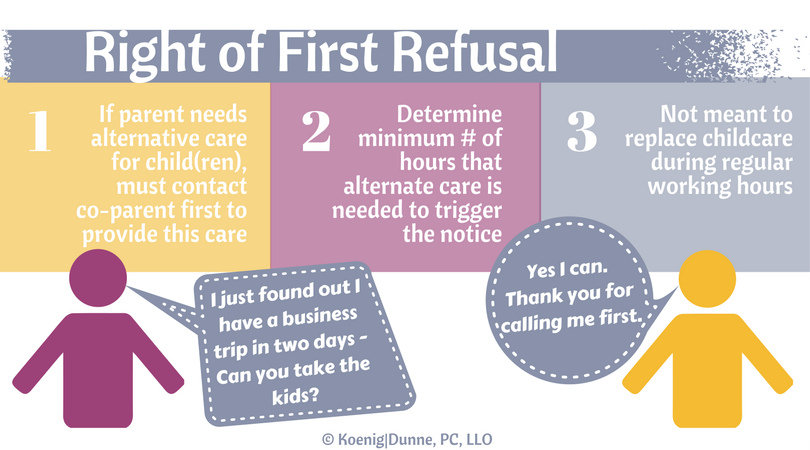When developing your parenting plan, you and your co-parent will craft a routine parenting time schedule, setting forth specific days and times when each parent will have parenting time. The parent exercising parenting time has the power to make every day parenting decisions during his or her time.
Some parents assume that if the “on duty” parent is unable to watch the child(ren), he or she will automatically call the other parent before finding alternate child care. However, no law requires this. Instead, you and your co-parent have the option of including a provision known as the “right of first refusal” in your parenting plan.
This provision requires the parent in possession of the child to first contact the other parent to allow him or her the option of caring for the child when he or she must arrange for alternate care. It is recommended to include a certain number of hours which triggers the right of first refusal provision.
EXAMPLE: At any such time as one of the parents shall not be able to provide his or her personal care of the minor child(ren) of the parties for a period of 24 hours or more, the other parent shall have the right to elect to provide said care before all others, including grandparents, stepparents, aunts, uncles, and friends.
If the “on duty” parent is going to be unavailable for any amount of time less than the what triggers the right of first refusal, he or she would not be required to contact the other parent first. For instance, if one parent is unavailable for two hours, and the right of refusal includes an eight-hour provision, that parent would not be required to call the other parent before finding alternate child care.
The right of first refusal requires the possessory parent to contact the other parent first. It does not, however, require the non-possessory parent to provide care. Parents choosing to include this right in their parenting plan should communicate with one another in a way that allows the “off duty” parent the most time to make arrangements in order to provide care and the “on duty” parent enough time to make alternate arrangements if the other parent cannot provide care.
Generally, the right of first refusal should not apply to periods of time during which the possessory parent is working his or her regularly-scheduled work hours and the child would normally be in school or child care.
It is important to note that the right of first refusal is not appropriate in every case, and can be very problematic for some parents. If you and your co-parent do not get along or communicate well, this provision is discouraged. If you do agree to include this provision, carefully think about the minimum number of hours required to trigger the provision. In most cases, anything less than eight hours is not advised.
The family law attorneys at Koenig│Dunne can counsel you regarding whether this provision is advisable for your unique circumstances.
Lindsay Belmont

